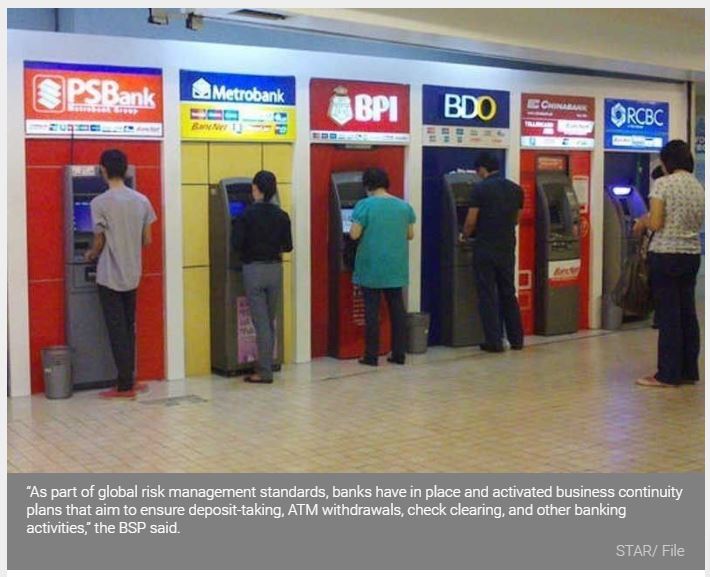Philippines: Business as usual for banks
MANILA, Philippines — Banks and other financial institutions are business as usual during the one-month community quarantine adopted by Malacañang in the National Capital Region to prevent the further spread of the coronavirus disease 2019 or COVID-19, according to the Bangko Sentral ng Pilipinas.
The BSP issued a statement Saturday evening assuring the public that the banking industry shall continue providing essential services to its clients.
“As part of global risk management standards, banks have in place and activated business continuity plans that aim to ensure deposit-taking, ATM withdrawals, check clearing, and other banking activities,” the BSP said.
While doing so, the regulator urged all banking personnel, especially frontliners, to carry out necessary protocols against COVID-19.
“The coronavirus outbreak is a public health crisis, not a financial crisis. Depositors are advised to remain calm as the banking system has the ability to service all withdrawals within a reasonable period,” the central bank said.
According to the BSP, it is closely coordinating with the Bankers Association of the Philippines (BAP), Chamber of Thrift Banks (CTB) and Rural Bankers Association of the Philippines (RBAP) for the industry’s current cash requirements.
In addition, the BSP said payment settlements continue to be performed through PhilPass.
“The BSP and the banking industry stand ready to ensure the safe and smooth functioning of the banking system,” it said.
BSP Governor Benjamin Diokno earlier urged the public to use electronic-banking and digital payment services to carry out needed financial transactions safely amid the public health crisis.
The BSP launched the National Retail Payment System (NRPS) in 2015 promoting interoperability, allowing digital financial transactions via the PESONet (Philippine EFT System and Operations Network) and InstaPay to raise the share of payments over electronic platforms to 20 percent by 2020.
The PESONet allows fund transfer processed in bulk and cleared at batch intervals from one account to one or several accounts maintained in different banks, while InstaPay allows customers to transfer peso funds of up to P50,000 per transaction almost instantly between accounts of participating banks.
A study conducted by the United Nations-led Better Than Cash Alliance (BCTA) showed the share of e-payments increased to 10 percent in 2018 from only one percent in terms of volume and to 20 percent from eight percent in terms of value.
On the other hand, the electronic money (e-Money) industry is supporting the call of the BSP to shift from cash to digital, where possible, in light of the COVID-19 pandemic.
Orlando Vea, chairman of the Philippine eMoney Association (PeMA) and founder of PayMaya Philippines, said the group supports the BSP’s call to the public to increasingly use digital transactions for social distancing and to avoid crowds.
“Digital financial services are already increasingly being used by Filipinos for remittance, person-to-person and bank transfers, bills payments, settlement of government taxes and social service contributions, online commerce, QR payments, and purchase of digital goods. The eMoney industry is fully committed to help mitigate the spread of COVID-19 through digital financial services,” Vea said.
Source: https://www.philstar.com/business/2020/03/16/2001103/business-usual-banks


 English
English




